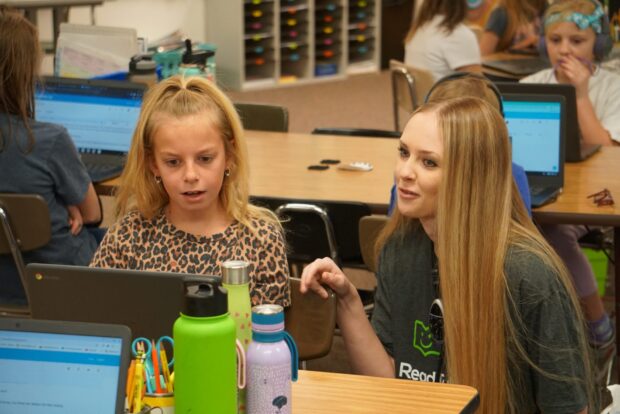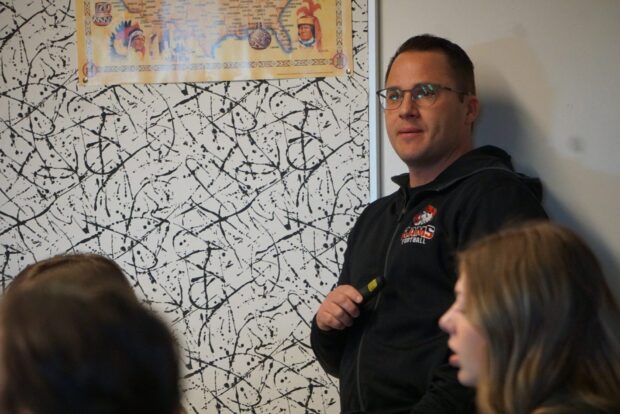Teachers Tiffany Lemos and Dane Beorchia didn’t know they’d each leave their schools on March 18 with $25,000 to spend on whatever they want.
Or that Oprah Winfrey would congratulate them and 60 other national recipients of this year’s Milken Educator Awards, also known as the “Oscars” for teachers. Winners can spend their cash award as they please.
“I was not expecting this at all,” an emotional Lemos said while standing next to a big check with her name on it during a surprise assembly at her Chubbuck Elementary School.
“It’s a lot to take in,” Beorchia said in a similar setting just five miles away in Highland High School’s gymnasium.
The Pocatello-Chubbuck School District teachers claimed the only two awards handed out in Idaho this school year — the Milken Family Foundation’s effort recognize educators who display innovation and inspirational leadership in the classroom. Panels appointed by states’ departments of education helped the foundation select the winners and arrange surprise assemblies honoring them.
Lemos’ efforts to fuse learning with students’ physical and mental health helped her capture the award. For Beorchia, it’s all about helping high schoolers gain a vision of their futures, especially through two tough pandemic years.
Both stressed the need to push kids academically, though they take vastly different approaches. We stopped by their classrooms last week to see how they do it.
Tiffany Lemos: A family philosophy

Lemos tries to make her class feel like family, which for her translates to pictures on the walls, flexible seating arrangements and a range of activities.
One emphasis includes helping kids be good to each other, and to themselves, through daily group activities. For “Thankful Thursday,” the kids sat in the back of the room as Lemos walked them through a reflective exercise for positive thinking.
Kids seated cross-legged on the ground greeted each other with elbow bumps and compliments.
“I like your shirt,” one said.
“You’re always nice to people,” said another.
“Ears on,” Lemos then said, asking the kids to repeat after her: “We are smart. We are intelligent. We persevere.”
Students took turns leading the group through versions of their own positive reinforcements. “We are mathematicians,” said one. Another: “We are kind.”
The kids then shifted back to their desks for a different activity, their third in 20 minutes. Moving around keeps their blood flowing, and provides them with occasional “brain breaks.” These and other meditative videos Lemos shows kids helped her nab the Milken award. Lemos understands the correlation between students’ physical and mental health and their ability to learn, said Milken Educator Awards Senior Vice President Jane Foley.
Classroom walls dressed up with words and images also reflect her teaching style, and mean different things to students:
- In the back of the room: A “Hopes and Dreams” wall features pictures of each child and rundown of their goals. “I hope to get better at math and reading to get more money for my family,” one wrote. “I hope to gain enough knowledge to read big books,” wrote another.
- On a side wall: An in-class library with dozens of books allows kids to pick one they like, and read at a standup desk for two nearby.
- Next to Lemos’ desk: a whiteboard allows kids to self-report their progress on certain assignments. The board is visible to everyone, but Lemos says that doesn’t stop the kids from reporting where they are accurately and acknowledging when they need help and why.
- Next to the classroom drinking fountain: an area devoted to the class’s “Explorer of the Week,” who gets to display a few of their favorite things and take charge of various activities for the week. They also get to sit in a big office chair at one of the room’s work tables.
Seating is another unique feature. Prior to COVID, kids could choose between normal classroom chairs, wobble chairs, stools, and chairs that slink up and down for more restless learners. To help with contact tracing during COVID, Lemos assigned students to certain chairs, rotating them around the room periodically. She plans to return to the choice model soon.
Pocatello-Chubbuck Superintendent Doug Howell praised the work Lemos has put into her classroom.
“I immediately noticed how welcoming of an environment she was able to create for her learners,” he said.
It all adds up to an eclectic teaching style, Lemos acknowledged, but that’s how she likes it.
“I’d say that an overarching philosophy for my teaching is to just be true to yourself,” she said. “You could be like any other teacher, but you should be yourself.”
Dane Beorchia: Connecting kids to careers

While Lemos’ students elbow bumped across town, Beorchia’s college-prep medical terminology class discussed a clinical phenomenon: pus. The kind that oozes from the skin like a pimple and the kind that abscesses underneath.
It’s stomach-turning stuff for some, Beorchia acknowledged, but it’s also a big part of his passion connecting kids to careers.
Beorchia says discussing things like pus and other bodily phenomena gives him an advantage when it comes to engaging kids. “They all have bodies, so it’s stuff they’re naturally interested in.”
And that helps the career-technical educator prep students for jobs right out of high school.
But his superintendent, his students and the Milken Foundation say he does much more.
“Dane has an innate ability to make immediate connections and engage in a meaningful way with his learners,” Howell said.
“He makes his classes challenging, but not overwhelming,” said sophomore Dallas Call, adding that Beorchia gives kids the “tools” and the “time” to be successful.
Call pointed to Beorchia’s approach of letting learners familiarize themselves with the class material via their textbook, then following up with deeper discussions and lectures that provide more detail and clarify difficult points.
“And he’s just super accessible if you need help beyond that,” Call added.
Beorchia’s accessibility was a sticking point for the Milken Foundation, which pointed to his connections with students and helping other teachers shift to remote learning models when COVID-19 shuttered schools.
Beorchia’s prior time teaching at a virtual school made those efforts easier, he said. Things that felt minor, like making sure students had his direct number at all times, had a big impact.
“My phone was blowing up for months,” Beorchia said of students who relied on him for extra help in his tougher college prep classes. He also knew the value of recording his remote classes over Zoom, so students could easily reference them when needed.
“The pandemic shifted the way we approach and think about education, and Beorchia pivoted with innovative teaching methods that provided exceptional learning experiences for students,” Foley said.
Another emphasis helped Beorchia nab the cash award: Connecting kids with industry professionals.
Each semester, he lines up guest speakers — local doctors, pharmacists, dentists and others — to provide variety for students.
“Most the time, they’re a neighbor or someone I know in the community,” he said.
It’s another minor effort that can carry big dividends, he added, referencing a recent speaker who engaged students by collecting their blood types while in class.
